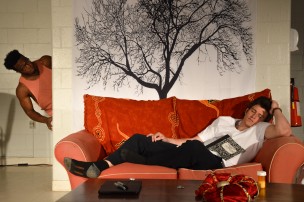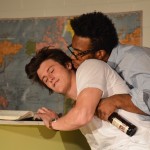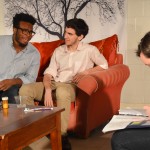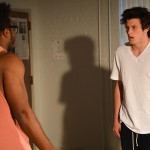Mike Edwards ’16 (left) plays Cooper, a rambunctious manchild in Second Stage’s production of “Really Really.” The show will continue in Malcolm X House on Friday, April 24 and Saturday, April 25.
Four years at Wesleyan have exposed me all types of theater, from a student-written play consisting solely of palindromes to an immersive, movement-based exploration of religious martyrdom. In this time, I have noticed a definite preference for “weird” theater, and a certain disinterest in realism. As a theater major, I am guilty of this bias myself and sometimes forget how exciting and effective realism can be.
Only occasionally will I see a production like “Really Really,” a Paul Downs Colaizzo play directed by Haley Rauch ’15 and stage managed by Hanako Rodriguez ’15, which demonstrates the extraordinary power of realism in its frank, nuanced portrayal of sexual assault on a college campus.
“Really Really” does not shy away from its subject matter of sexual violence, nor does it feel forced or didactic.
“When we talk about sexual assault, we don’t talk about people; we talk about cases,” Rauch said. “Cases are often black and white, perpetrator and victim, and I wanted to highlight the subtleties of a story like this.”
The play opens with Grace (Cassie Willson ’17) and Leigh (Willa Beckman ’15) drunkenly stumbling home from a college party, in a scene that immediately feels relatable. In fact, much of the play is eerily familiar, from the crushed solo cups strewn around the set to the crude banter and details of sexual exploits.
At the beginning of the play, we learn that Leigh and Davis (Elias Camacho ’18) have slept together, even though Leigh has a boyfriend named Jimmy (Daniel Giovaniello ’17). Jimmy is slightly clueless, but means well, and Leigh, who is from a less-privileged socioeconomic background, finds security and comfort in his devotion to her. Giovanniello’s skillful portrayal of Jimmy is utterly human, simultaneously endearing and pitiable.
The next morning, Davis remembers nothing of his tryst with Leigh, and is horrified when she accuses him of rape. Camacho’s Davis brings multi-dimensionality to the role and invokes the audience’s empathy while retaining the sense that he, like anyone, can be violently dangerous. Camacho particularly shines in the last scene, where his commitment to the role becomes incredibly visible.
The power of “Really Really” lies in its ambiguity and its layers of interpretation, and so it is difficult to decipher the truth. Much like the characters, the audience doesn’t know what to believe, or who to root for. Is Davis, the golden boy of the play, capable of raping someone? Is Leigh capable of lying about what happened?
“In high-profile sexual assault cases, if a victim isn’t the perfect victim, then society often refuses to acknowledge they are a victim at all,” Rauch said. “But in the play, there aren’t really ‘good guys’ or ‘bad guys.’ They’re just people trying to do their best, even if their best isn’t that great.”
As the play progresses, the characters get tangled up in a web of accusations, ruined reputations, and self-interest. Leigh’s sister, Haley (Rubye Peyser ’18), arrives on the scene and provides a stark contrast to the affluence of Davis, Cooper, and Jimmy. Peyser’s stage presence as Haley is impressive, and the few scenes that she appears in are exciting and charged with sexuality and humor.
“Really Really” obviously deals with the very serious issue of sexual assault, but the play also examines class differences, race, gender dynamics, and sexuality. Rauch worked hard to make sure her production was conscious about how it handled such sensitive material—and the people working with it.
“My team was very open about it from the start. We wanted to make sure everyone knew it was a safe environment, and that rehearsal space was very different from the real world,” she said. “I was very concerned about psychological safety, so I spoke to Alysha Warren [Wesleyan’s Sexual Violence Resource Coordinator and Therapist] beforehand to gain some insight on how to approach some of the scenes.”
Rauch’s direction shows phenomenal attention to detail, while maintaining a cohesive narrative.
“Directing is so much about being flexible and figuring out what works for a particular actor in a specific scene,” Rauch said. “One of the things I learned from directing was the importance of having a creative vision. I think everything in a production should be specific and necessary, so we really tried to make sure every element was meaningful and made sense, from the design to the character work.”
The cast also does a wonderful job of illustrating the complexities of navigating social issues as a Millennial. Grace, president of the Future Leaders of America, particularly exemplifies the unique struggles of this generation of students in her speeches at a conference. Wilson’s depiction of Grace is vivacious and natural, and her speeches are completely convincing. Likewise, the scene in which Grace accuses Leigh of lying is one of the more uncomfortable, brutally genuine moments in the play.
Beckman’s performance as Leigh shows a tremendous understanding of realistic acting and the value of subtlety. Her interpretation of Leigh is unpredictable and always fascinating. Beckman is able to convey raw desire, immense power, and complete vulnerability in a single performance, often through the slightest of gestures or expressions.
Some actors take on a lighter role. The repartee between Cooper (Mike Edwards ’16), a rambunctious manchild, and Johnson (Uma Dieffenbach ’17), a bookish student, is particularly lively and humorous. Edwards and Dieffenbach’s characters serve as the perfect foils to one another, and watching the actors play off each other is a delight.
Ultimately, “Really Really” is an important, incredibly relevant piece of theater for everyone in the Wesleyan community. Furthermore, it proves the value of realism in art, at a school where realism is perhaps not the most popular style. “Really Really,” however, stands out as thought-provoking, courageous, and unflinchingly honest.
“Really Really” will continue at Malcolm X House on Friday, April 24 at 8 p.m. and Saturday, April 25 at 6 p.m.
- Emily Feher, Contributing Photographer











